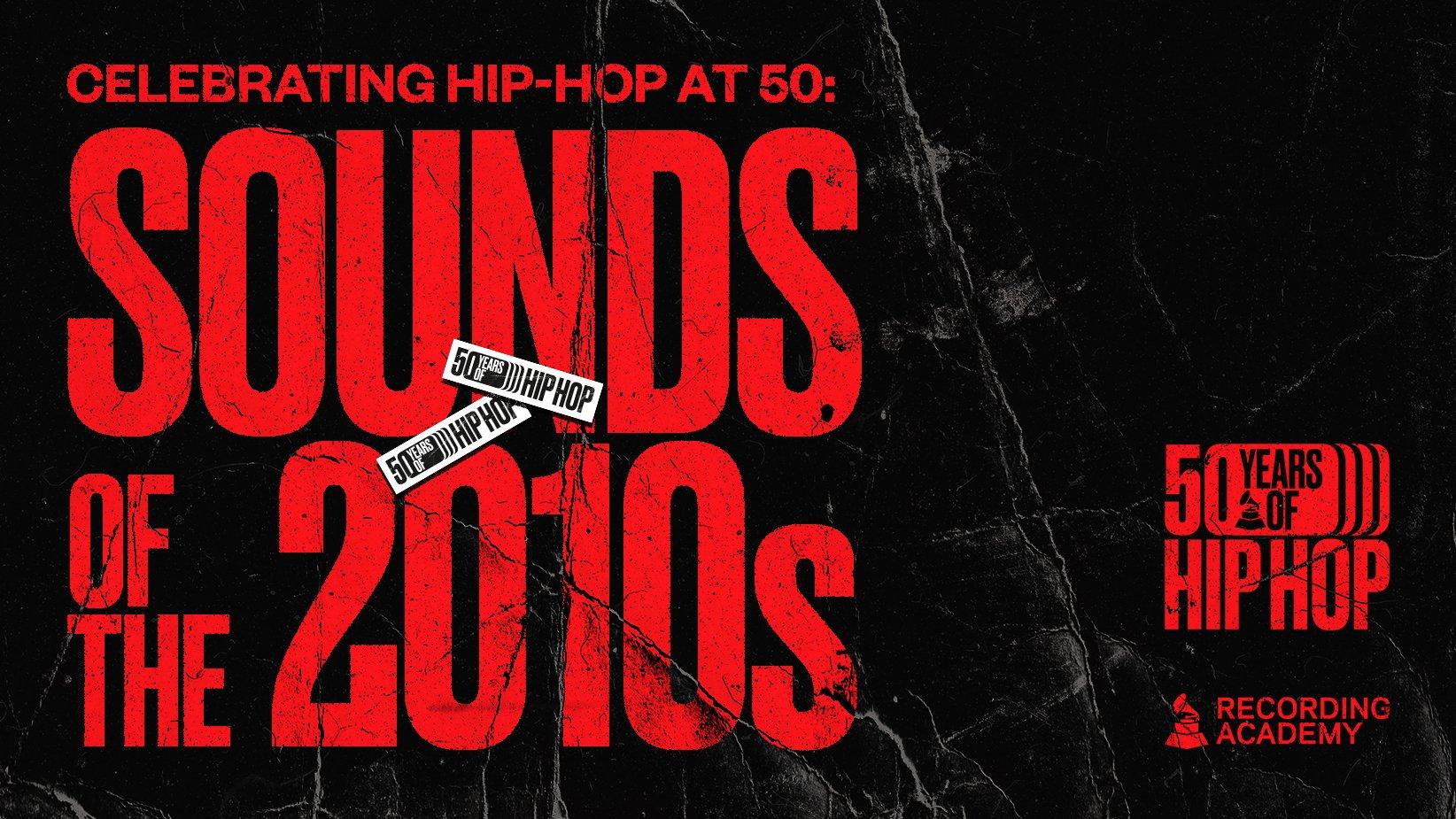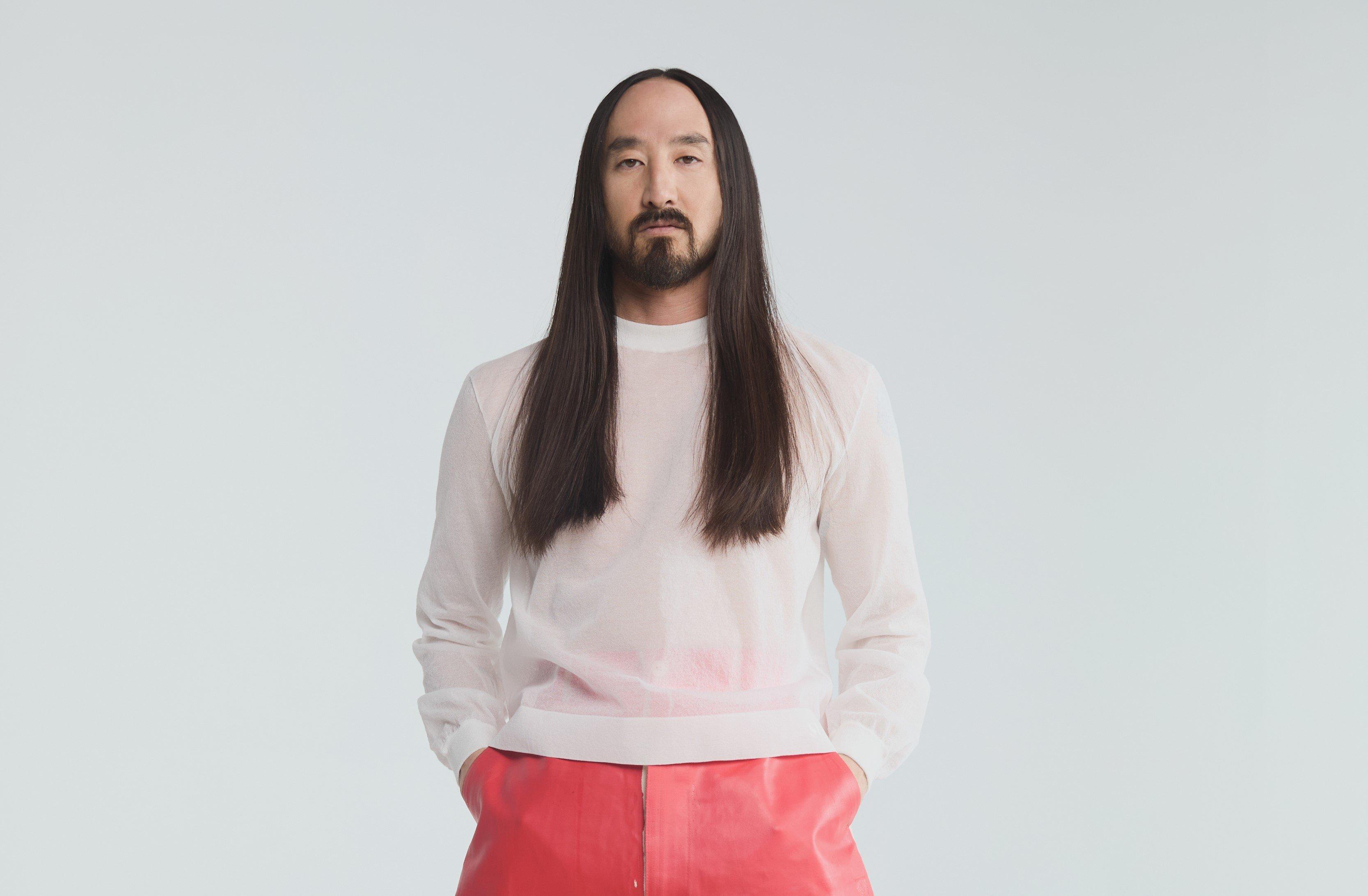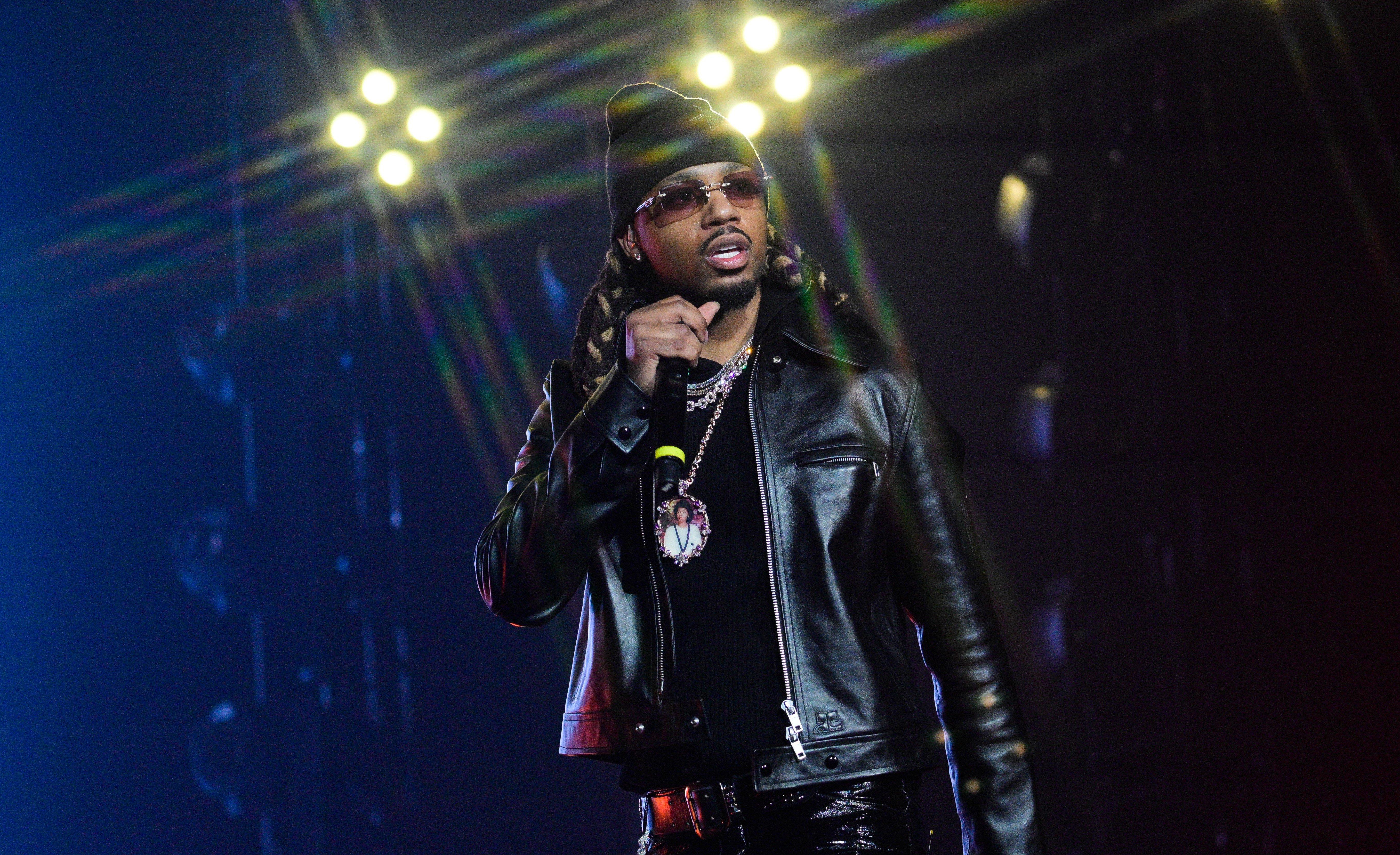Peso Pluma marked his musical destiny with a Tupac tribute tattoo in the center of his clavicle: "All Eyez On Me."
The Mexican artist, born Hassan Emilio Kabande Laija, doesn't remember exactly what year he inked his chest. He knows it was well before his debut in music. Those four words reflected Peso's irrefutable confidence that the world's eyes would eventually be on him.
The world's eyes are indeed on Peso Pluma. In less than two years, the singer achieved global fame by singing corridos tumbados, traversing a path never before trodden by a música Mexicana artist.
At 25, Peso Pluma is at the forefront of a new generation of música Mexicana artists that have successfully modernized traditional Mexican rhythms, such as corridos, by infusing them with elements from urban music and a hip-hop aesthetic. The weight of representing an entire genre and a country could be great for some. But pressure doesn't affect Peso Pluma; on the contrary, it motivates him to keep working to exalt his roots.
"We've come a long way, but we still have a long way to go. And that doesn't mean we have to slow down; it doesn't mean everything is over. This is the beginning of everything," Peso Pluma said in a TikTok video before a performance at the Toyota Arena in Ontario, Canada, a little over a year ago.
Out June 20, Peso's extensive new album ÉXODO seeks to cement his global star status further. Over 24 tracks, the singer continues to explore corridos tumbados and digs into his urban side via much-awaited collaborations with reggaeton and hip-hop icons. Among those big names is Peso's teenage idol, the American rapper and producer Quavo, as well as further afield collaborations with Cardi B.
"ÉXODO is a project I've been working on for over a year before we even won the GRAMMY. GÉNESIS was an incredibly special project, and I knew we couldn't make the same diamond twice," the singer tells GRAMMY.com in a written interview.
Peso Pluma's path to the global stage has been lightning-fast. While he started releasing songs in 2020, Peso will remember March 2023 as the month that propelled him into global mega-stardom. His collaboration with Eslabón Armado on "Ella Baila Sola" led him to become a household name outside his native Mexico.
The hit resonated with an audience eager for new sounds, accompanying social media videos and surpassing a billion streams on Spotify. "Ella Baila Sola" became the first Mexican music track to top the platform's global chart. On Billboard, it conquered No. 1 on the magazine's Global 200 chart for six weeks and reached the coveted No. 4 spot on the Hot 100 chart. The mega-hit took Peso Pluma and Eslabon Armado to make their Latin GRAMMY stage debut in November with an electrifying performance.
Another collaboration, "La Bebe (Remix)" with Mexican reggaeton artist Yng Lvcas, released a day after "Ella Baila Sola," also contributed to Peso Pluma's virality in a completely different genre, but one in which he feels comfortable: urban music.
Learn more: Peso Pluma's 10 Biggest Collabs: From "Bzrp Sessions" To "Ella Baila Sola" &"Igual Que Un Ángel"
As Peso Pluma gained traction with a global audience, his February 2022 single with Raúl Vega, put him, for better or worse, on the map in Mexico. The warlike content of "El Belicón" lyrics and video clip attracted attention for the way it allegedly promoted narcoculture.
Despite growing criticism, Peso Pluma remained tight-lipped regarding references to high-profile members of the Mexican drug trade, as well as drug use and trafficking. In a rare admission to GQ magazine, the singer explained this is a "delicate subject to talk about, but you have to touch on it with transparency — because it's the reality of things."
"In hip-hop, in rap, just like in corridos, and other urban music like reggaeton, it talks about reality. We're not promoting delinquency at all. We're only talking about things that happen in real life," the singer explained.
With the success of "El Belicón" and "Ella Baila Sola" under his belt, Peso Pluma released GÉNESIS in June 2023. Despite being his third album, Peso considers it his true debut in music.
"I didn't want to delete my previous albums [Efectos Secundario and Ah Y Que?] because they represent my beginnings," Peso told Billboard in a cover story published a few weeks after the release of GÉNESIS. In the same conversation, the singer said he saw himself winning his first GRAMMY and breaking more records.
Read more: 5 Takeaways From Peso Pluma's New Album 'GÉNESIS'
In February 2024, Peso Pluma did just that. He took home the golden gramophone for Best Música Mexicana Album (Including Tejano) — his first GRAMMY Award. This victory didn't weigh on him as he approached his next production. "It pushed me to want to create something different that the fans haven't heard from me before," Peso Pluma tells GRAMMY.com.
While GÉNESIS and ÉXODO may differ in substance, they share similarities beyond music. That both records pull from the Bible for their names is not a random occurrence; the opening book of the Hebrew and Christian Bible delves into the genesis of creation, while the Book of Exodus explores the themes of liberation, redemption, and Moses' role in leading the Israelites through the uncharted waters of the Red Sea.
"ÉXODO is the continuation of GÉNESIS, which was the beginning," Peso Pluma explains to GRAMMY.com. "ÉXODO means new beginnings, a new era for me. We are preparing for the next chapter, and that's what we are doing for Mexican music, paving the way, laying the groundwork for what's next because it doesn't stop here."
His "sophomore" album is divided into two discs: the first is corridos, and the second is urban. It also continues the line of collaborations, with twenty tracks where Peso Pluma shares the limelight.
"Some of my fans were craving música Mexicana, and some were craving urbano, and I wanted to give them everything while still staying true to myself and choosing songs and lyrics that spoke to me," he continues.
ÉXODO's disc one starts with "LA DURANGO," the album's fourth single, featuring Eslabon Armando and Junior H. In the record, he also invites collaborators such as Natanael Cano and Gabito Ballesteros for "VINO TINTO" and Mexican rising star Ivan Cornejo on the melancholic "RELOJ," among others.
For Side B, Peso enlisted heavyweights from the urban genre in the Anglo and Latin markets: Anitta in the steamy "BELLAKEO," Rich The Kid in the bilingual "GIMME A SECOND," and Quavo in the existential trap "PA NO PENSAR." Cardi B, Arcángel, Ryan Castro, Kenia OS, and DJ Snake complete ÉXODO's genre crossover.
ÉXODO, luxury, drugs, alcohol, and women continue to take center stage in the lyrics, accompanied by fast-paced guitar-driven melodies and reverb-dense vocals. However, the production sheds light on the vulnerable side of Peso and explores the unexpected consequences of becoming globally famous.
"Fans really get to see the other side of the coin; there are two sides to me. It's darker, rawer," Peso says about the record.
In the songs "HOLLYWOOD" and "LA PATRULLA," for example, Peso details how this musical path keeps him up at night, as well as his aspirations, and how he remains the same despite his success.
Perhaps one of the deepest and rawest songs on the album is "14:14," a track inspired by the Bible verse 14:14 from the Book of Exodus, which, the singer explains, was fundamental amidst the turbulence he faced on the way to global stardom.
"[The] verse 14:14 says 'The LORD will fight for you; you need only to be still.' This verse couldn't be truer," Peso Pluma says. "Over time, I learned to really trust in this and believe that some things are not up to me and I should trust the process."
In the song — one of the few on the album without a collaboration — Peso references the challenges of his profession and how his faith has kept him afloat amid the vicissitudes. "Things from the job that no one understands/I hide the rosary under my shirt so I don't poison myself, so I don't feel guilty/because whatever happens, the Boss will forgive me," he sings.
In "BRUCE WAYNE," Peso Pluma croons about the passionate feelings his career arouses: "First they love you, and then they hate you/wishing the worst, envy and death," the song says.
The singer resorts to comparing himself to a superhero figure again. In an unusual twist, Peso crosses comic universes, moving from his now traditional reference to Spider-Man to one from the DC Comics world: Bruce Wayne, Batman's secret identity. A wealthy man, part of Gotham's high society, Bruce Wayne is known for transforming his darkness into power while remaining reserved and isolated.
"Everyone has two sides of them, even me," Peso tells GRAMMY.com. "Peso Pluma on stage is a high-energy person, someone who is powerful and dominates a show and isn't afraid of anything. And then there is Hassan, who's chill and more relaxed and who deals with all the realities of life."
During the year and a half it took him to complete ÉXODO, Peso Pluma had to deal with the diverse nuances of a global star's life, including a widely publicized breakup from Argentine rapper/singer Nicki Nicole, the cancellation of one of his shows in October 2023 after a Mexico drug cartel issued a death threat against him, and a media frenzy over his alleged admission to a rehabilitation clinic, the latest a rumor he laid to rest during a March interview with Rolling Stone for his Future of Music cover story.
"The reality is, all these days, I've been in the studio working on ÉXODO," the artist explained to Rolling Stone.
Most of 2023 was a successful balancing act for Peso Pluma, who combined touring, an album release, rare media engagements, two Coachella appearances, all the while developing another record. According to the singer, ÉXODO was created in Los Angeles, Miami, New York, and Mexico. "We go to the studio everywhere!" Peso says. "It doesn't really matter where we are; I love to get into the studio and work when we have free time."
Like GÉNESIS, ÉXODO will be released via Peso Pluma's Double P Records, of which he is the CEO and A&R. Much of the talent the Mexican singer has signed to his label took part in the album's production, and songwriting process.
"For the Mexican music side, I had the whole [touring] band with me; I like to have them involved in the process so that we can all give our input on how it sounds, discuss what we think needs to be changed, create new ideas," he explains.
Peso Pluma knows that echoing the success of 2023 is no easy task. He was the most streamed artist in the U.S. on YouTube, surpassing Taylor Swift and Bad Bunny, and was the second most-listened to Latin artist in the country, amassing an impressive 1.9 billion streams, according to Luminate.
Música Mexicana emerged as one of the most successful genres in 2023, witnessing a remarkable 60 percent surge in streaming numbers, adds Luminate's annual report, crediting Peso Pluma along Eslabon Armado, Junior H, and Fuerza Regida as part of this success.
Collaborations on and off the mic have undoubtedly played a significant role in the rise of Música Mexicana on the global stage. Peso knows that the key to continuing onward is teaming up with renowned artists inside and outside his genre.
"All of us coming together is what pushed música Mexicana to go global," the singer affirms. "We showed the world what Mexico has to offer, and now no one can deny the power and talent we have in our country."
Shakira's Road To 'Las Mujeres Ya No Lloran': How Overcoming A Breakup Opened A New Chapter In Her Artistry










